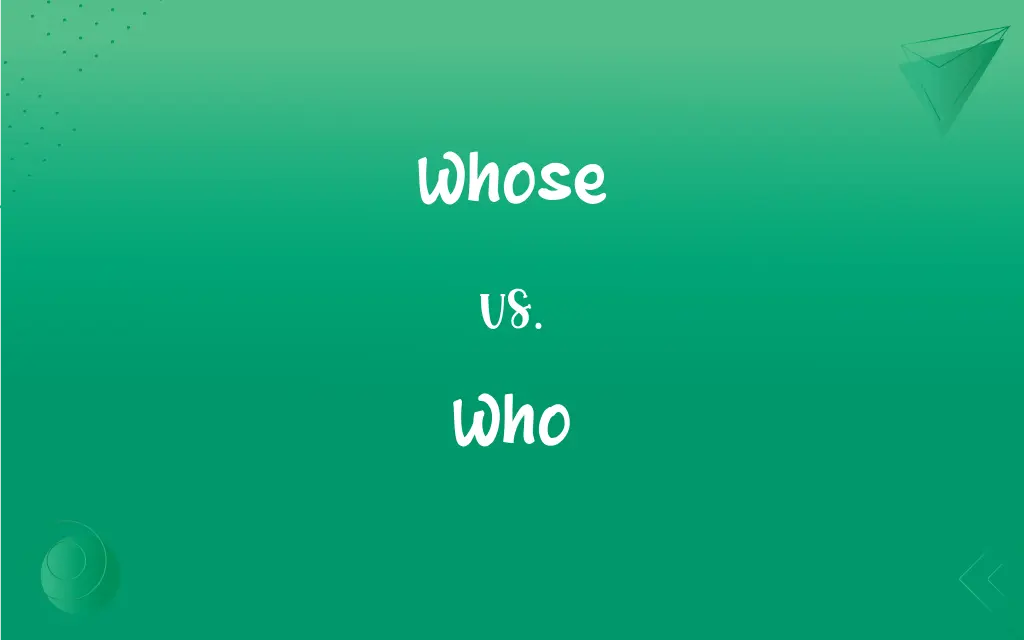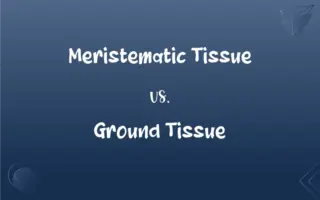Whose vs. Who: What's the Difference?
Edited by Aimie Carlson || By Harlon Moss || Published on January 16, 2024
'Whose' is a possessive pronoun indicating ownership, while 'who' is a pronoun used to ask about or describe a person.

Key Differences
'Whose' is used to indicate possession or ownership. It is a possessive pronoun that can be used in questions or relative clauses to ask or tell about who owns something. On the other hand, 'who' is used as an interrogative or relative pronoun to ask or describe which person or what kind of person is involved.
'Whose' is often used in questions to inquire about the owner of an object or the person responsible for something. For example, "Whose book is this?" asks about the ownership of a book. In contrast, 'who' is used to identify or inquire about a person's identity or characteristics. For instance, "Who is the author of this book?" is asking about the identity of the author.
In relative clauses, 'whose' links a noun to a clause that provides additional information about the owner of that noun. For example, in the sentence "That's the scientist whose research changed the field," 'whose' connects 'the scientist' to their significant accomplishment. 'Who', however, is used to refer to people in clauses that give more information about them, as in "She is the scientist who won the award."
'Whose' does not have a gender or number restriction; it can refer to singular or plural, male, female, or non-binary. Conversely, 'who' is also gender-neutral and can refer to one or more individuals, but it specifically pertains to their identity or role.
Understanding the correct usage of 'whose' and 'who' is important for clear communication. While 'whose' is all about ownership or association, 'who' is about the identity or description of people.
ADVERTISEMENT
Comparison Chart
Function in Sentence
Indicates possession or ownership
Asks about or describes a person
Usage
Used in questions and relative clauses for ownership
Used as an interrogative or relative pronoun for identity
Example Sentence
"Whose car is parked outside?"
"Who is the president?"
Relative Clauses
Links a noun to a clause about ownership
Links a subject to a clause about identity
Restrictions
Gender-neutral, can refer to singular or plural
Gender-neutral, refers to individuals or groups
ADVERTISEMENT
Whose and Who Definitions
Whose
'Whose' indicates belonging to or associated with which person.
Whose responsibility is it to lock the doors?
Who
'Who' introduces clauses that provide additional information about a person.
She is the athlete who broke the world record.
Whose
'Whose' is a possessive pronoun used to ask about ownership.
Whose keys are on the table?
Who
'Who' refers to people in a general or specific sense.
Who can help me with this task?
Whose
'Whose' connects a noun to a clause describing ownership.
She is the writer whose novels I admire most.
Who
'Who' is a pronoun used to ask about or describe a person.
Who won the game last night?
Whose
'Whose' can refer to people or things in terms of possession.
Whose phone keeps ringing during the meeting?
Who
'Who' is used to identify or specify individuals or groups.
Who are the members of the committee?
Whose
'Whose' is used to inquire about the possessor of an item.
Whose idea was it to start this project?
Who
'Who' is used in questions to inquire about a person's identity.
Who is speaking at the conference?
Whose
The possessive form of who.
Who
(interrogative) What person or people; which person or people; asks for the identity of someone; used in a direct or indirect question.
Who is that? (direct question)
I don't know who it is. (indirect question)
Whose
The possessive form of which.
Who
(relative) Introduces a relative clause having a human antecedent.
Whose
(interrogative) Of whom, belonging to whom; which person's or people's.
Whose wallet is this?
Who
With antecedent as subject.
That's the man who works at the newsagent. (defining)
My sister, who works in the accounts department, just got promoted to manager. (non-defining)
Whose
(relative) Of whom, belonging to whom.
Venus, whose sister Serena is, won the latest championship.
Who
(non-formal) With antecedent as object: whom.
Whose
(relative) Of which, belonging to which.
Who
Whoever, he who, they who.
Who insults my mother insults me.
Whose
(interrogative) That or those of whom or belonging to whom.
Several people have lost their suitcases. Whose have you found?
Who
A person under discussion; a question of which person.
Whose
(relative) That or those of whom or belonging to whom.
This car is blocking the way, but Mr Smith, whose it is, will be here shortly.
Who
Whose
Who phone just rang?
Whose
The possessive case of who or which. See Who, and Which.
Whose daughter art thou? tell me, I pray thee.
The question whose solution I require.
Who
One; any; one.
As who should say, it were a very dangerous matter if a man in any point should be found wiser than his forefathers were.
Who
A United Nations agency to coordinate international health activities and to help governments improve health services
FAQs
Is 'whose' only used for people?
No, 'whose' can refer to both people and things.
Is 'who' used for both singular and plural?
Yes, 'who' can refer to both singular and plural subjects.
How do I use 'whose' in a sentence?
Use 'whose' to indicate possession, as in "Whose coat is this?"
Can 'whose' indicate ownership of ideas?
Yes, 'whose' can be used to ask about the ownership of ideas or concepts.
How does 'whose' function in a question?
'Whose' functions as a possessive interrogative in questions.
Can 'who' be used for objects?
No, 'who' is specifically used for referring to people.
Can 'whose' be used in formal writing?
Yes, 'whose' is appropriate in both formal and informal contexts.
What is the possessive form of 'who'?
The possessive form of 'who' is 'whose'.
What type of pronoun is 'who'?
'Who' is an interrogative and relative pronoun for people.
How do I choose between 'whose' and 'who'?
Use 'whose' for possession and 'who' for identifying people.
How is 'whose' used in relative clauses?
'Whose' introduces a clause providing information about the owner of a noun.
Is 'whose' a contraction?
No, 'whose' is not a contraction.
Does 'who' have a plural form?
No, 'who' remains the same in both singular and plural contexts.
Can 'whose' refer to animals?
Yes, 'whose' can refer to animals when indicating possession.
Is 'who' used in relative clauses?
Yes, 'who' is commonly used in relative clauses.
Does 'who' have different forms for different cases?
Yes, 'who' changes to 'whom' in the objective case.
Can 'who' be used for indefinite subjects?
Yes, 'who' can refer to indefinite subjects.
Is 'who' gender-specific?
No, 'who' is gender-neutral.
Can 'who' start a question?
Yes, 'who' often begins interrogative sentences.
Can 'whose' be used without a following noun?
Typically, 'whose' is followed by a noun or noun phrase.
About Author
Written by
Harlon MossHarlon is a seasoned quality moderator and accomplished content writer for Difference Wiki. An alumnus of the prestigious University of California, he earned his degree in Computer Science. Leveraging his academic background, Harlon brings a meticulous and informed perspective to his work, ensuring content accuracy and excellence.
Edited by
Aimie CarlsonAimie Carlson, holding a master's degree in English literature, is a fervent English language enthusiast. She lends her writing talents to Difference Wiki, a prominent website that specializes in comparisons, offering readers insightful analyses that both captivate and inform.






































































